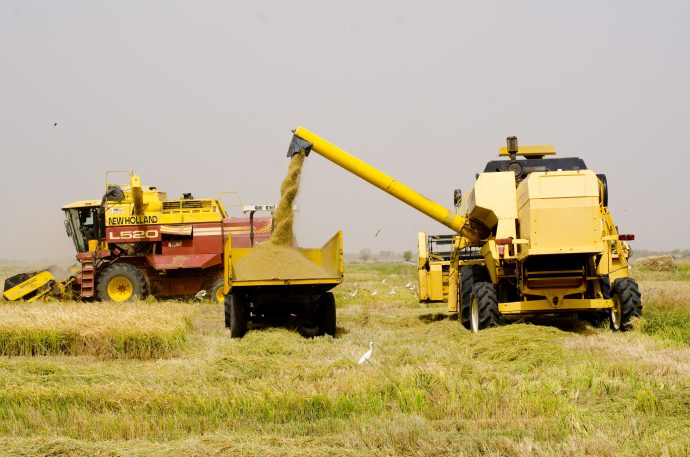
James Zumwalt, U.S. Ambassador to Senegal, stands with Ibrahima Sall, the founder of Coumba Nor Thiam, a medium-sized rice milling firm established in the northern part of Senegal. USAID/Senegal is working with the firm and other enterprises to develop a system to improve smallholder rice farmers’ ability to access urban markets. / USAID/Senegal
“Localize it” is a phrase that increasingly resonates in the world of development. It echoes the growing voice from the field calling for greater local involvement, locally based solutions, and empowerment of local communities.
This is all the more true in the context of building partnerships with the private sector to address development objectives.
As a Foreign Service National, I am proud to be a Senegalese native working for USAID to create partnerships with the private sector that enhance the Senegal mission’s development objectives.

USAID/Senegal is partnering with local private sector actors such as Coumba Nor Thiam, a medium-sized rice milling firm in northern Senegal, to improve smallholder rice farmers’ ability to access urban markets. / USAID/Senegal
To me, “localize it” is more than just a phrase—it is the foundation of my career. I have always believed that development is first and foremost a community’s commitment to uplift itself from the vulnerabilities that are caused by poverty, diseases, inadequate infrastructure or poor governance. And that stems from the people and systems within those communities.
The power of “localize it” is demonstrated by Ibrahima Sall, the founder of Coumba Nor Thiam, a medium-sized rice milling firm established in northern Senegal. The USAID mission in Senegal is working with the firm and other enterprises to develop a system to improve smallholder rice farmers’ ability to access urban markets.

USAID is partnering with Senegalese firms throughout the rice value chain to scale up rice production through improvements in processing capacities, storage facilities and modernized harvesting equipment. / USAID/Senegal.
When we spoke, I could feel Ibrahima’s passion and engagement for advancing communities that he’s been part of for the past 50 years. Ibrahima knows how to build loyalty among smallholder farmers so they can be motivated to supply higher-quality rice for his milling company. He understands the cultural nuances that allow him to create a trusting environment, necessary to operate in challenging settings where formal mechanisms may not always be enough. Ibrahima has a stake in the future of his community; he is a local agent for sustainable impact.
In the field, you will find many success stories of engaged local private sector actors, like Ibrahima, growing their enterprises with and within their communities. Whether it is creating the right storage conditions for cereal production, providing maternal health service delivery, developing solar-based solutions to improve access to electricity, or using IT services to transform a village perspective on the world, all of them strive to open a world of new opportunities.
Local solutions are implemented through local stakeholders to address local problems and create stronger local ecosystems. That is the path to sustainability.
At USAID, we partner to end extreme poverty by helping those who are working to improve their lives, their communities and their nations. Together, we work to raise the quality of life of people around the world, whether through improving food security or increasing access to quality health care. Ibrahima and his counterparts, through market-driven approaches, are helping us achieve our goals.

By partnering with local companies in Senegal’s rice value chain, USAID is working to increase food security and decrease poverty. / USAID/Senegal.
There are great opportunities to partner with local agents of sustainable impact and to design pathways and mechanisms to facilitate the building of those partnerships. This can be done through our implementing partners, but also directly, as local systems and solutions should be used to scale up impact.
Take, for example, the Senegalese rice sector. USAID is partnering with an alliance of rice millers, smallholder farmers federations, and the Senegalese government to scale up rice production and improve access to markets. This partnership aims to significantly reduce imports and create sustainable economic growth opportunities within Senegal.
Foreign Service Nationals have a key role to play in advancing this agenda of local solutions across all sectors and areas of interventions with government, private sector organizations, universities and NGOs. USAID Administrator Gayle Smith said Foreign Service Nationals “bring a tremendous amount of expertise to USAID’s work – not just in the history, culture and politics of the countries where they serve, but in every sector where we work.”
Our sector expertise and understanding of the local context, as well as our established network of relationships in-country, are an asset to USAID. But we are also important to our respective countries. As we work with and for USAID to support the efforts of the government and other local stakeholders, we also become agents of sustainability, driving that path towards more self-reliance.
The “localize it” hymn has certainly been sung before, no doubt about it, but I want to reinforce it. Indeed, in the realms of private sector partnerships, we often look, and rightly so, to partner with the big multinationals that have business interests which overlap with our development goals. And in that endeavor, we could be tempted to overlook the many local people and organizations that may have lesser means and recognition, but hold the seeds to flower a true development purpose. Those are, like Ibrahima, at the core of the notion of partnering for sustainable impact in development.
ABOUT THE AUTHOR
RELATED LINKS:
- Learn more about how USAID/Senegal is creating jobs, improving access to education and health care, strengthening democratic institutions, and developing the agriculture sector to increase production and incomes
- Read about how USAID uses partnerships with the private sector to accelerate and scale sustainable impact through the U.S. Global Development Lab
- Follow @GlobalDevLab on Facebook and Flickr


Leave a Reply